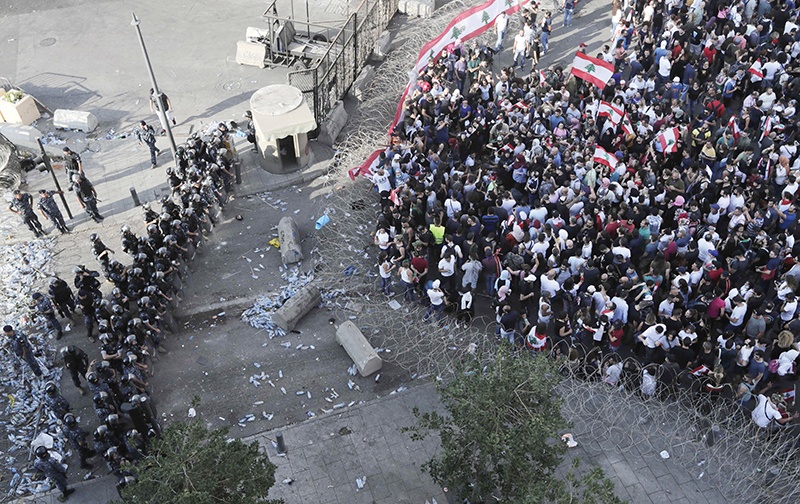

BEIRUT: Securityforces fired tear gas and chased down protesters in Beirut after tens ofthousands of people across Lebanon marched to demand the demise of a politicalelite they accuse of looting the economy to the point of collapse. Riot policein vehicles and on foot rounded up protesters, according to Reuters witnesses.They fired rubber bullets and tear gas canisters, dispersing demonstrators inBeirut's commercial district. Dozens of people were wounded and detained.
Prime MinisterSaad Al-Hariri blamed his partners in government for obstructing reforms thatcould ward off economic crisis and gave them a 72-hour deadline to stopblocking him, otherwise hinting he may resign. Hariri, addressing protesters,said Lebanon was going through an "unprecedented, difficult time".Lebanon's biggest protests in a decade recall the 2011 Arab revolts thattoppled four presidents. Lebanese from all sects and walks of life have comeout on to the streets, waving banners and chanting slogans urging Hariri'sgovernment to go.
The ralliesfollow warnings by economists and investors that Lebanon's economy andgraft-riddled financial system are closer to the brink than at any time sincethe war-torn 1980s. "There are those who have placed obstacles in front ofme ... and in the face of all the efforts that I have proposed forreform," Hariri said, without naming names. "Whatever the solution,we no longer have time and I am personally giving myself only a little time.Either our partners in government and in the nation give a frank response tothe solution, or I will have another say," he said. "The deadlineleft is very short. It's 72 hours."
'Step down'
Protesters pouredthrough villages and towns as well as the capital Beirut for the third day. Nopolitical leader, Muslim or Christian, was spared their wrath. Their chantscalled for leaders including Hariri, President Michel Aoun, and ParliamentSpeaker Nabih Berri to step down. The mood was a mixture of rage, defiance andhope. As night fell, crowds waving Lebanese flags marched through the streetsas patriotic music blared from loudspeakers. They shouted: "Our demandsare one, our objective is one: the people want the downfall of theregime."
Some protestersfainted as security forces fired tear gas. The Red Cross said its teams hadtreated 160 people wounded in protests since Thursday evening. "You shouldbe protecting us. Shame on you," a young man yelled as he covered his faceagainst the choking fumes. Lebanon's internal security apparatus said 52 policewere injured on Friday and its forces arrested 70 people. Some protesters,including men in black hoods, blocked roads, set tyres on fire and used ironbars to smash storefronts in Beirut's posh downtown district.
As fires blazed,some streets in the capital looked like a battlefield, strewn with rubberbullets, smashed up cars, broken glass and torn billboards. Firefightersstruggled late into the night to douse the flames. With demonstrators crowdingaround Aoun's palace in Baabda, the United Nations urged all sides to refrainfrom actions that could lead to more tensions and violence. Saudi Arabia,Kuwait and the United Arab Emirates warned their citizens against travelling toLebanon. Bahrain told its nationals to leave at once.
'Totally corrupt'
Foreign MinisterGebran Bassil, Aoun's son-in-law, also blamed other parties for blockingreforms, saying the government must work to stop corruption and avoid imposingnew taxes. The latest unrest erupted out of anger over the rising cost ofliving and new tax plans, including a fee on WhatsApp calls. "We came tothe streets because we can no longer bear this situation. This regime istotally corrupt," said Fadi Issa, 51, who marched with his son.
"They areall thieves, they come into the government to fill their pockets, not to servethe country." In an unprecedented move, Shiite protesters also attackedthe offices of their deputies from the influential Hezbollah and Amal movementsin southern Lebanon.
To boostrevenues, a government minister on Thursday unveiled a new fee for WhatsAppcalls that fuelled outrage. But as the protests spread hours later, TelecomsMinister Mohamed Choucair revoked the planned levy. In a country fracturedalong sectarian lines, the unusually wide geographic reach of the protestshighlights the deepening anger of the Lebanese. The government, which includesnearly all Lebanon's main parties, has repeatedly failed to implement thereforms needed to fix the national finances.
Foreign allieshave pressured Hariri to enact reforms long promised but never deliveredbecause of vested interests. Shattered by war between 1975 and 1990, Lebanonhas proportionally one of the world's highest debt burdens. Economic growth hasbeen hit by regional conflict, while unemployment among the under-35s runs at37%. Sectarian politicians, many of them civil war militia leaders, have usedstate resources for their own benefit and are reluctant to give that up.-Agencies

